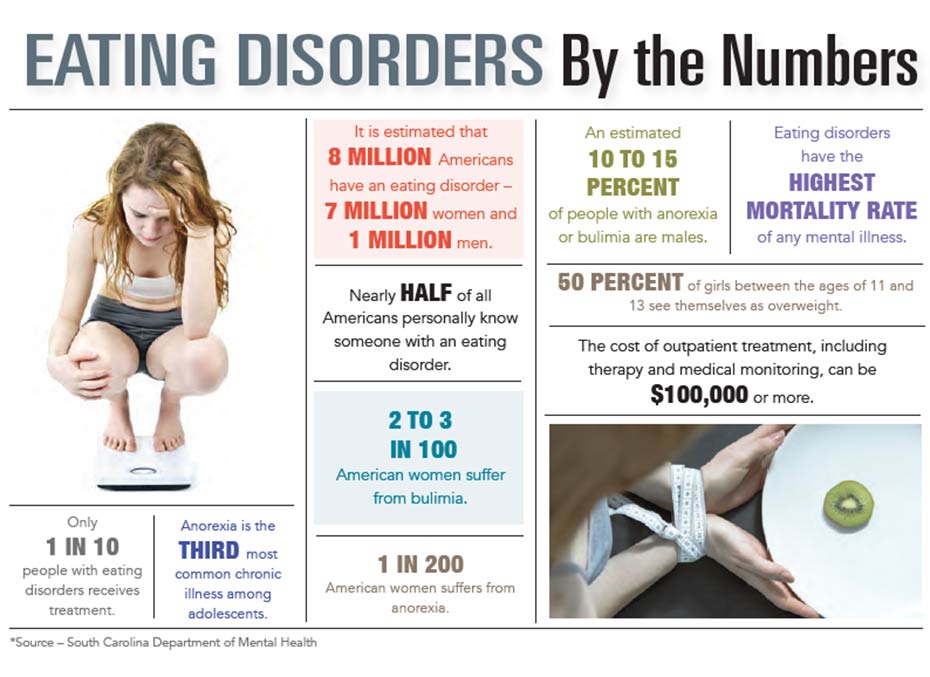According to the American Psychiatric Association, eating disorders are illnesses in which people experience severe disturbances in their eating behaviors and related thoughts and emotions. People with eating disorders typically become preoccupied with food and with their body weight. An eating disorder takes over one’s thoughts, body and life. As someone who has recovered from anorexia and bulimia, I know there is hope for recovery. I want to share this hope with you.
As stated on the Stanford School of Medicine website, “Early detection followed by effective treatment is of utmost importance in preventing the debilitating and dangerous course of illness that eating disorders often follow.”
According to The National Eating Disorder Association, anorexia nervosa is an eating disorder characterized by weight loss — or lack of appropriate weight gain in growing children; difficulties maintaining an appropriate body weight for height, age and stature; and, in many individuals, distorted body image. Anorexia involves intense restriction of food intake. NEDA defines bulimia as a serious, potentially life-threatening eating disorder characterized by a cycle of binging and compensatory behaviors such as self-induced vomiting, designed to undo or compensate for the effects of binge eating.
Anorexia and bulimia ruled my life for many years. I reached a point where I was terrified of the “shadow self” that I had become. In the beginning, the journey to recovery was a slow progression, but each step was worth it. I had the love of my husband, Dylan. His love for me saved my life because it gave me the desire to live. I was ready to take the necessary steps to recover. I began to see a local therapist, Mary Sheahan Krainin, who is also a part of the group COPE – Charleston Outpatient Professionals for Eating Disorders. Through weekly therapy, I worked at minimizing negative self-talk and silenced the voice of the eating disorder.
Krainin has helped me find my voice, rather than using the voice of an eating disorder. Her work in the Lowcountry is felt strongly; she is always among the first to volunteer to help with fundraisers for prevention and awareness of eating disorders. Krainin reflected on the reasons why it is important to seek early treatment.
“Many people do not realize that chronic dieting, severe weight fluctuation, obsession with food labels as well as calorie and fat intake, thinking and dreaming about food obsessively but not eating, fatigue, yet excessively exercising are all reasons to seek the help of a health care professional. You could be suffering from an eating disorder,” she said.
Krainin added: “What is concerning is the lack of awareness among our general population as well as our medical community regarding eating disorders. Symptoms may not be recognized and may go unnoticed even at the doctor’s office or clinic.”
I know Krainin is making a difference in the lives of many individuals and families whose lives are affected by an eating disorder.
I also spoke with Sherie Corbett, a therapist with Healing Roots Behavioral Health Center, LLC.
“Despite the wide array of eating disorders, I find rational living therapy and mindfulness especially helpful in working with all of my patients,” she said. “I help them realize the importance of thought and retrain their brains. Mindfulness is being in the moment and especially beneficial to learn and incorporate into daily tasks, such as eating.”
Meditation has been a tool in my recovery. There is great comfort in knowing that I can pause. I can pause to slow down and to ease anxiety.
I understand the constant intrusive thoughts of an eating disorder, being physically and mentally cold, and, at the core of everything, the pain. It is never too late to choose recovery. If you or a loved one are suffering from an eating disorder, I want you to know this: You will smile again, you will laugh again, you will dance again and you will experience joy again.
I will conclude with one of my favorite quotes that inspired me along my path to recovery and continues to do so every day.
“Hope is the thing with feathers
That perches in the soul
And sings the tune without the words
And never stops at all”
— Emily Dickinson

Establishing a strong support system is also an essential part of eating disorder recovery. According to Eating Disorder Hope, learning how to cope in positive ways and efficiently manage your emotions will be valuable tools in maintaining your recovery.
It may feel overwhelming to begin the recovery process, but it is so worth it. There are many available resources in the Lowcountry. In addition, the National Eating Disorders Association provides resources and how to locate them. If you or a loved one is wondering where to start, you may want to consider visiting the NEDA website.
According to Columbia University’s Department of Psychiatry, complications of eating disorders are serious and can include malnutrition, organ damage, emotional distress and death. Eating disorders have the highest mortality rate of any mental illness. It is essential that we raise awareness and promote prevention and early intervention to save the lives of those who suffer from an eating disorder.
Eating disorders affect several million people at any given time, according to psychiatry.org. There are three main types of eating disorders: anorexia nervosa, bulimia nervosa and binge eating disorder.
By April Duckworth








